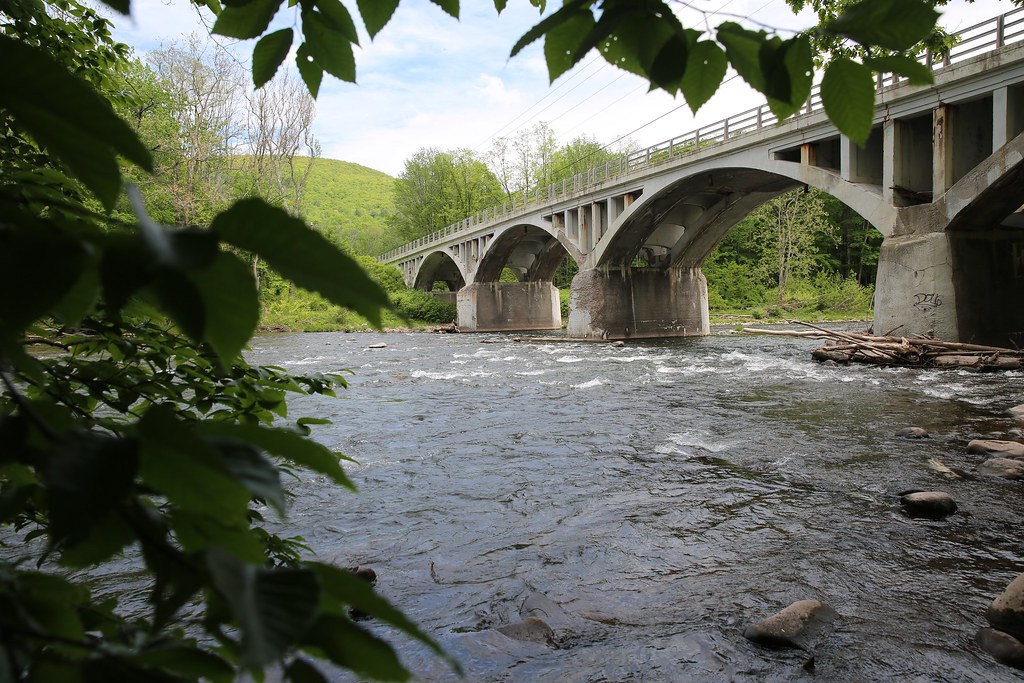NYC DEP Announces Upcoming Project to Replace two Bridges Near Ashokan Reservoir
October 29, 2021
$33 million project to replaces the bridges on Route 28A will begin in November
The New York City Department of Environmental Protection (DEP) today announced the start of a $33 million project to replace two bridges along Route 28A near Ashokan Reservoir. The project, which will start in November, will also relocate about one-half mile of the roadway and expand the Boiceville Bridge Trailhead for the Ashokan Rail Trail.
“This construction project near Ashokan Reservoir underscores DEP’s commitment to maintaining the roads and bridges that New York City is responsible for in the watershed,” DEP Commissioner Vincent Sapienza said. “Our water supply employees, local residents, and visitors rely on our roadway infrastructure to be in a state of good repair, which is why DEP continues to invest in the 57 bridges and 99 miles that we are responsible for across the water supply. We also look forward to expanding the Boiceville Bridge Trailhead for the Ashokan Rail Trail so that this popular recreation path can be accessible to more visitors during its peak seasons.”
The largest component of the project involves replacing the bridge that carries Route 28A over the Esopus Creek in Boiceville. The existing bridge, known locally as the Five Arches Bridge, was built during the original construction of Ashokan Reservoir and put into service in 1913. A new bridge will be constructed just south of the existing bridge. The 384-foot-long bridge will sit atop two new piers that will be driven into the bed of the creek. Engineers will use watertight barriers known as cofferdams to exclude the creek from the work area, build the piers’ footings in dry conditions, and protect water quality. The existing bridge will remain open to the traveling public while the new one is built to ensure there is no disruption to local traffic. The original bridge and its piers will be demolished once the new one is finished.
The project includes three additional upgrades to road and bridge infrastructure along this westernmost portion of Route 28A. DEP will replace a second, smaller bridge that carries Route 28A over the rail corridor that is owned by Ulster County. The new bridge will be 43 feet long and preserve access to the corridor. The intersection of Route 28 and Route 28A will be reconfigured. That intersection is currently a “Y” intersection that controls traffic through a combination of yield and stop signs. The new intersection will be a more traditional “T” intersection with stop signs and turning lanes to organize the flow of traffic. Lastly, about one-half mile of Route 28A will be reconstructed to meet the new bridge alignments and straighten a severe S-curve in the roadway just west of the two bridges.
Once finished, the project will also include new or expanded recreation amenities that provide access to the Ashokan Rail Trail and the hamlet of Boiceville. The Boiceville Bridge Trailhead will be upgraded at the end of the project to include 10 additional parking spaces for those who use the rail trail and fish at nearby access locations along the Esopus Creek. The new bridge over the Esopus Creek will include a walking and biking path constructed by DEP to the end of city-owned property. The New York State Department of Transportation has coordinated with the city and local officials to extend that recreation path into the hamlet of Boiceville, providing a new link between the rail trail and the hamlet.
The project will start in November with the removal of trees in areas where the new bridges will be constructed, and where Route 28A will be reconstructed. About eight parking spaces will be temporarily removed from the Boiceville Bridge Trailhead to make room for construction materials and offices for the duration of the project. The project is expected to be completed by 2025. DEP does not anticipate any lane closures or traffic disruptions.
DEP manages New York City’s water supply, providing more than 1 billion gallons of high-quality water each day to nearly 10 million New Yorkers. This includes more than 70 upstate communities and institutions in Ulster, Orange, Putnam and Westchester counties who consume an average of 110 million total gallons of drinking water daily from New York City’s water supply system. This water comes from the Catskill, Delaware, and Croton watersheds that extend more than 125 miles from the City, and the system comprises 19 reservoirs, three controlled lakes, and numerous tunnels and aqueducts. DEP has nearly 6,000 employees, including almost 1,000 scientists, engineers, surveyors, watershed maintainers and other professionals in the watershed. In addition to its $70 million payroll and $168.9 million in annual taxes paid in upstate counties, DEP has invested more than $2.7 billion in watershed protection programs—including partnership organizations such as the Catskill Watershed Corporation and the Watershed Agricultural Council—that support sustainable farming practices, environmentally sensitive economic development, and local economic opportunity. In addition, DEP has a robust capital program with $20.1 billion in investments planned over the next decade that will create up to 3,000 construction-related jobs per year. For more information, visit nyc.gov/dep, like us on Facebook, or follow us on Twitter.





